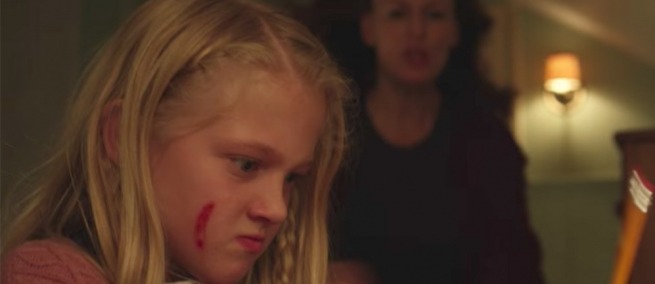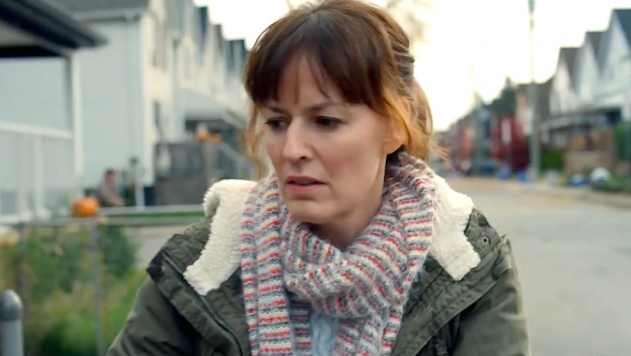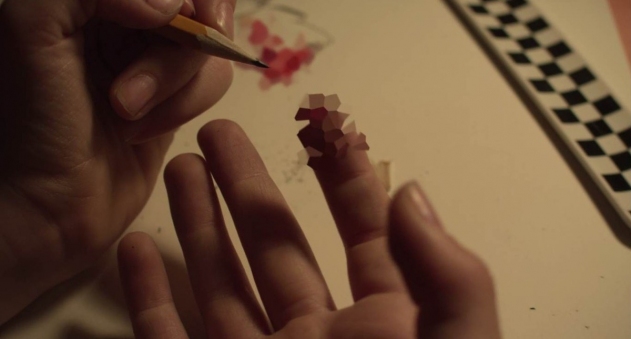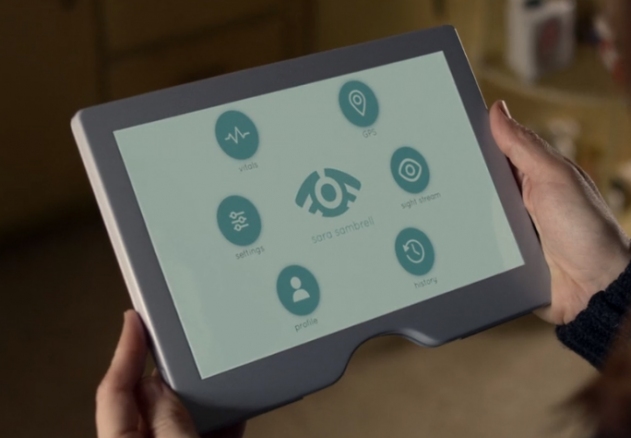
In BLACK MIRROR’s episode “Arkangel”–directed by Jodie Foster–a worried mother installs a piece of technology into her daughter’s head, and, with the associated software, monitors everything that she feels, sees, and does. Not only does she monitor it, she can choose to filter some of it out. A frightening dog becomes a pixelated lump in the daughter’s mediated view. Marije Nouwen is a Belgian-based ethnographer who studies digital media and parental control tools. She and Science & Film spoke over Skype about “Arkangel,” episode two of BLACK MIRROR’S latest season on Netflix.
Science & Film: What were your reactions to BLACK MIRROR’S episode “Arkangel”?
Marije Nouwen: It was quite recognizable, the way that the episode focuses on the anxieties that parents have when children grow up. From a technological point of view, the device–the Arkangel–really taps into things that are technologically possible.
What for me seemed a little easy about the writing of the episode was that it tapped into stereotypes; as the child grows old she is doing drugs, and all of a sudden everything goes wrong–whereas that doesn’t happen for all the teenagers growing up. But I enjoyed watching it and I think it gave a good starting point to talk about the ins and outs, and dos and don’ts, when you give parents a bit of control over what their child can and can’t experience.

S&F: One of the ways that I read that shift in the character of the daughter, when she starts experimenting with drugs as you’re saying, was that it was tied to the fact that for so long she was prevented from knowing anything about the world. So, she went in the opposite direction as soon as she could. It brings up the question of what the repercussions might be to implementing parental controls.
MN: Certainly. As the girl was growing up, she never saw anything that could cause her anxiety, or that she was unfamiliar with. When all of a sudden the controls disappeared, there were so many things she didn’t know, so many bad things. She never knew how to cope, how to deal with feelings of uncertainty or anxiety–things we all need to deal with as we grow older. If we can speak in terms of cause and affect, it’s true that was partly caused by the fact that she was so protected from everything that might have even slightly upset her.
S&F: In terms of your research, how do you study this?
MN: Researchers are looking at which strategies are best for parents to use to prevent harm from online content, or to mitigate online risks. I research parental mediation. Our work is slightly different in the sense that our focus hasn’t been so much on which strategy is best but more focused on which strategies parents use to handle all these digital devices in their home. Within that research strategy, more and more researchers are now getting away from the idea that we have to mitigate these risks. Instead, these encounters with possible inappropriate, offensive, unfamiliar, or scary or offensive content are actually necessary because you have to learn how to deal with them. We are now looking more into strategies for parents to explore the internet together with their kids. It’s more about how we can teach families to talk about what they see online. Something might make them feel bad, but it will happen, so then in what ways can families find strategies to avoid it in the future? That’s a bit of the change in the research field: from, we have to protect our children to, we cannot protect them so what can we do as parents to teach and also to learn with our children?
We often think that parents know best. Actually, that’s not always the case. Usually I talk both with the children and the parents in my research. If a child plays a game, it might be violent because they use a sword, or are killing someone, or there is blood, and for the parent it is a shock because, oh my god, their child is playing some killing game. But the child sees something completely different. They see the game mechanics. For them the game has some kind of goal, and maybe it’s not upsetting at all. In that sense, parents don’t always know how children are looking at something. So can we assume that the parent knows best? I would say no. That’s quite important.

S&F: Do parental controls inflict any harmful effects on the child?
MN: For parental controls specifically, when you put restrictions on the media use of your children and your child doesn’t know about it, then that will cause a breach of trust between the parent and the child. In an ideal world, there is some possibility for open communication in a family so when there is something wrong the child can talk with their parents. But, when you have really controlling parents usually this possibility for conversation is not there.
S&F: That’s like the very end of the episode. What you’re talking about so far are parental controls that can be implemented in cyberspace, but in that space parents and children might experience things differently. That must be a new challenge for the field.
MN: It is exactly that problem that is really fascinating. Usually, for younger children the Internet is just a really fun place to be, but parents think about all the things that might go wrong.
S&F: You mentioned that from a technological standpoint the episode seemed realistic. What are some of the technologies that are currently in use for parental control?
MN: There are different kinds of restrictions the parents can impose. There are content restrictions, so the parent can decide words or themes that you don’t want your child to see. Sex or porn is a very common example for that, but a parent can go further and if they have some political conviction then they can also try to protect their children from content from that perspective. There are child-friendly browsers so instead of using Chrome, for instance, to look for games for your four-year-old, you can install a child-friendly browser which by default and design only has access to videos or games appropriate for a certain age category. Also, with some parental controls you can decide whom your child is talking to. Platforms are also integrating these kinds of functionalities. I don’t know if you’ve heard about Messenger Kids? It’s Facebook Messenger directed to children under 13. It is linked to a parent account and there the parent can decide with whom the child can or cannot talk. It’s almost approving a friend request. So those type of functionalities already exist.
You can also restrict activities. For instance, on every smart phone you can define if one user profile can or cannot make in app purchases–that is, buy something in an app or in a game. You can block access to certain applications on your smartphone.
Every phone has a GPS so you can follow your child. You even have smart watches for children with a GPS signal. You can define a perimeter where you will get an alarm if they go outside of that area.
What doesn’t exist, or exists only in a less up to date mode, is how the mom in the episode could see what the child was seeing. I don’t know if there’s any commercialized platform, application, or device that can do that. But what you can have as a parent is some kind of report of the websites your child has visited, including chats/conversations. There is an application that will alert you when your child is being bullied. So the functionalities that you see in the episode are really close to what is already possible.

S&F: The episode is a bit of a cautionary tale about implementing too many of these parental controls. Is there any ideal scenario that you can imagine given what current technology enables?
MN: Parents and children learning together is the ideal. But I sometimes wonder if that is possible. Just talking with different parents, there are so many ways of raising children. The ideal would be yes, that they can learn together, that there is some kind of open and nice relationship, but I also know that it’s not true in every family. Something I really try to look into is in what ways can these technologies actually help parents and children to do that? So not just for parents to be in the know about what children are doing, but focusing more on sharing. What does a child want to share with the parents, and in what ways is that possible? For instance, one of the findings from my previous studies was that, although parents want to know what their child is doing, mainly they just want to be reassured that their child is safe online. At the same time, younger children like sharing, and even showing their interests. Is it possible to bridge those two challenges, a parent who wants to be reassured and a child who wants to share? Can we use technology to facilitate this? Can technology bring parents and children together? These are some of the questions I am looking into.
Marije Nouwen is a researcher based at the University of Leuven in Belgium. She works at the Meaningful Interactions Lab, and studies the design of learning devices, parental and teacher mediation devices for digital media, and interaction design. In 2017, Nouwen was a visiting scholar at Georgia Tech’s School of Literature, Media and Communication.
“Arkangel” is episode two of BLACK MIRROR season four, available on Netflix. It is directed by Jodie Foster. Charlie Brooker, creator of the series, is the writer. The episode stars Rosemarie DeWitt, Brenna Harding, Owen Teague, Aniya Hodge, Sarah Abbott, and Nicky Torchia.
TOPICS